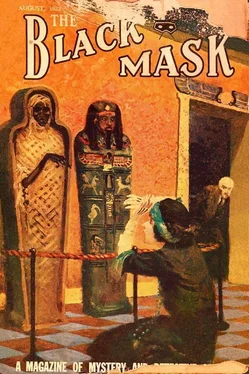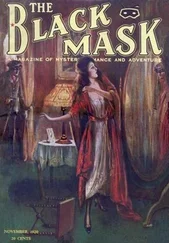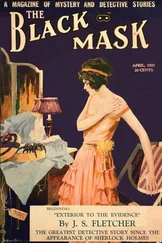John Baer - The Black Mask Magazine (Vol. 5, No. 5 — August 1922)
Здесь есть возможность читать онлайн «John Baer - The Black Mask Magazine (Vol. 5, No. 5 — August 1922)» весь текст электронной книги совершенно бесплатно (целиком полную версию без сокращений). В некоторых случаях можно слушать аудио, скачать через торрент в формате fb2 и присутствует краткое содержание. Город: New York, Год выпуска: 1922, Издательство: Pro-Distributors Publishing Company, Жанр: Детектив, на английском языке. Описание произведения, (предисловие) а так же отзывы посетителей доступны на портале библиотеки ЛибКат.
- Название:The Black Mask Magazine (Vol. 5, No. 5 — August 1922)
- Автор:
- Издательство:Pro-Distributors Publishing Company
- Жанр:
- Год:1922
- Город:New York
- ISBN:нет данных
- Рейтинг книги:4 / 5. Голосов: 1
-
Избранное:Добавить в избранное
- Отзывы:
-
Ваша оценка:
- 80
- 1
- 2
- 3
- 4
- 5
The Black Mask Magazine (Vol. 5, No. 5 — August 1922): краткое содержание, описание и аннотация
Предлагаем к чтению аннотацию, описание, краткое содержание или предисловие (зависит от того, что написал сам автор книги «The Black Mask Magazine (Vol. 5, No. 5 — August 1922)»). Если вы не нашли необходимую информацию о книге — напишите в комментариях, мы постараемся отыскать её.
The Black Mask Magazine (Vol. 5, No. 5 — August 1922) — читать онлайн бесплатно полную книгу (весь текст) целиком
Ниже представлен текст книги, разбитый по страницам. Система сохранения места последней прочитанной страницы, позволяет с удобством читать онлайн бесплатно книгу «The Black Mask Magazine (Vol. 5, No. 5 — August 1922)», без необходимости каждый раз заново искать на чём Вы остановились. Поставьте закладку, и сможете в любой момент перейти на страницу, на которой закончили чтение.
Интервал:
Закладка:
At Mrs. Figg’s, again. Neither the body nor the trunk had come. Irene sat there in that poor room, her handkerchief over her eyes. The trunk came first. It was put into the room. She paid the express man, didn’t open the trunk. The body came a little later, in the poor, cheap coffin. The man opened the coffin. She asked him to. She was afraid she wouldn’t know how. She said she wanted another look at her sister.
Mrs. Figg came into the room, went out again. Irene closed the door, locked it — she wanted to be alone with — with the dead.
She opened the trunk, worked hurriedly. Nervously, tears streaming down her face, her teeth clenched, she managed, somehow, to get the stiff body out of the coffin and into the trunk. She locked the trunk again, closed the coffin. That was done. She sunk exhausted, ill, on a chair. She couldn’t stop, now. What next?
She left the house. She hailed a passing express wagon. She had a trunk to go away. Could the driver take it at once? He thought he could.
Mrs. Figg was not in sight. That saved some explaining. She watched the man as he moved the trunk out of the house onto the wagon. She gave him the address of her apartment, stood looking at him until he drove off.
Irene stopped at the undertaker’s again, the one on the corner. She told him to get the coffin now, at once. Yes, she would come back for the money, later. She couldn’t, of course — but that...
She went into a drug-store, opposite, called up Mrs. Figg. She had got the telephone number from the telephone in the hall.
“I’m — I’m sending for — for the body, after all,” she explained. “The man is on the way. I–I couldn’t stand to have things done there, after all. I’ll write a note. Thank you...”
She hung up the receiver dizzily. That was done. If the undertaker could only get the empty coffin out without Mrs. Figg suspecting — connecting things... Mrs. Figg might wonder. Even so — she’d never do anything, if the coffin was taken away. Well, there was nothing she could do about it.
She took a taxicab, this time. She was too weak for the subway. She sat there, on the edge of the seat, her fingers clenched.
She stopped the taxi on the corner, got out. She had left her watch at home. She wondered about the time. The wagon would be slow — he had two other trunks to deliver, she knew. She must do something to kill time — until the trunk came — until dark, even.
What could she do? Why, she’d bake a pie. Of course. She stopped in at the grocer’s. She saw some blueberries, bought some of them. A blueberry pie — Dennison’s favorite pie. Why not? It would look so domestic.
With the bundles in her arm, she came into the apartment building. She met Mrs. Grant and talked with her. She thought of the watch — put that in. That was a good bit!
She put on her housedress and an apron. She got to work with the pie. It was comforting, working in the dough. The pie was finished — in the oven — when the trunk — the body — came. When it was safely in the apartment she sat down, trembling.
It had worked out! She had the body! Here — now! If only things kept on...
Mrs. Peterson in the hall! She showed her the pie — promised her a piece, later. What a fool!
Schmidt, the janitor, passed. She talked to him, too.
She was alone in the apartment — with the trunk. Irene was afraid of corpses. She had never touched one except a few minutes ago. She opened the trunk. She had to stop, start again. She was quite ill. But, before she was through, the strange woman had clipped blonde hair, instead of her former long tresses, and was dressed in Irene’s own clothes. That was done!

She shivered. Was she going to be caught? She prayed to her God, a God she had rather neglected during the past years. Her prayers were sincere enough. Why couldn’t she get away with it? Dennison — Dennison would get what was coming to him — if things went right.
That was over. She could get ready, now. Irene started to change her clothes. She looked at her fingers and her apron, stained with blueberries. Yes — it had to be done. She dressed the corpse in her own house-dress, her own berry-stained apron. Then, her fingers wet with berry juice, she stained the fingers of the dead woman. Now, she covered the face, knotted a towel around the throat, thrust the body into the closet of her bedroom. She heard a noise in the hall. She sat in a chair, shuddered, for half an hour before she dared move or wash her hands. She washed them thoroughly, then. She was afraid you caught things from dead people.
Irene cooled herself under a shower, made rather a careful toilet. It was after five o’clock. There was something else to do, now.
She heard someone in the hall. She hoped it was someone she knew — but not too well. It was a man’s step — a man coming home.
She threw a chair against a wall, pushed a table, kicked another chair, said, “Oh, God, Stuart,” threw another chair.
That was done.
She adjusted the window, packed her bag — not forgetting a little bundle of things she would destroy, later. She took her jewelry. She put her wrist watch on the dressing-table, to one side, so it wouldn’t be too noticeable. She hated to lose it. Still, with her other things. She had been economical. She could sell her jewelry later. She could get a job, maybe meet some young man, marry, even. Why not? Women did worse things than she did and got married. Worse? Well, she hadn’t been so bad — so really bad — if things would work out...
She turned the dressing-table drawers out, disarranged the other things.
She sat at the window behind the white curtain, watched the traffic. She couldn’t be seen, she knew. She couldn’t light a light. She was hungry. She couldn’t go out for fear of meeting someone, until dark. She hated the apartment — memories — the closet...
She tiptoed around. Yes — everything was right. She repacked her bag to make sure. She could take only a few things so it would look as if all of her thing’s were there. No one knew just what she had. The bit of paper in the corner of it — the woman’s hair — her clothes — she touched it gingerly. She could get rid of that easily enough.
Yes — the signs of disorder — the window. The police wouldn’t think it was a burglar — they were just clever enough for that — yet, she hoped, not too clever...
She felt around, felt the familiar things. She could see a little from the street lamp, outside— It was nearly time to go. Dennison — would things come out the way she had planned? The apartment! The closet! Did she dare? Dare? She had to, now. There was nothing else to do. She started in to sob, kneeling at the side of her bed.
“Oh, Stuart,” she sobbed, “come back to me, come back to me. Oh God...”
She could leave, now. She could get a ticket, go on to Chicago. That would be best. She didn’t know anyone in Chicago. It was surprising how few people she knew any place. In Chicago, she’d go to the Y. W. C. A., take a new name, find a position, even let her hair grow, maybe.
A new name? Any name. She’d think one up. Only she mustn’t change her initials. That would be bad luck, unless she got married. Any name but Irene Graham...
She pinned on her hat. She could go, now. She was hungry. She went into the kitchen. Where, in the dim light, she saw the pie she had made. Why not take a piece? She didn’t care much for blueberry pie. She wondered, now, why she had bothered — how she had had the nerve to make it. Why not eat a piece, as long as it was there. They might blame a neighbor — the police, anyone. She cut a piece of pie, ate it. It was good pie. Too good for what it was made for. To think of all the pies she had made during the two years, for Dennison. Stuart — she had loved him — really had. Well, he’d get what was coming to him. She’d forget it all — these two years — Stuart Dennison — the apartment — the — inside the closet...
Читать дальшеИнтервал:
Закладка:
Похожие книги на «The Black Mask Magazine (Vol. 5, No. 5 — August 1922)»
Представляем Вашему вниманию похожие книги на «The Black Mask Magazine (Vol. 5, No. 5 — August 1922)» списком для выбора. Мы отобрали схожую по названию и смыслу литературу в надежде предоставить читателям больше вариантов отыскать новые, интересные, ещё непрочитанные произведения.
Обсуждение, отзывы о книге «The Black Mask Magazine (Vol. 5, No. 5 — August 1922)» и просто собственные мнения читателей. Оставьте ваши комментарии, напишите, что Вы думаете о произведении, его смысле или главных героях. Укажите что конкретно понравилось, а что нет, и почему Вы так считаете.












